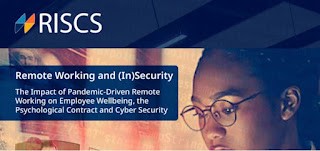Cyber 9/12: Why We Fight* Learning from competition. By Robert Carolina, Senior Visiting Fellow
Once again, 2020 was a great year for CDT student participation in the Atlantic Council “Cyber 9/12 Strategy Challenge.” The third annual competition in London was the toughest to date, starting with a competitive entry process. Of more than 30 UK-based teams who applied, only 17 (including two teams from RHUL CDT) were selected to compete. One of our teams went on to the Final Round of this year’s competition, placing Third.
Convened in different locales around the world, teams
comprised of four students simulate the high-pressure task of analysing
available information about cyber security threats, synthesising these, and
briefing senior government officials with findings and recommendations. The
competition relies upon information sources assembled into a briefing pack such
as (real) research reports, (real and simulated) online media, (real and
simulated) private sector threat analysis, (simulated) classified government
intelligence reports, and even a (simulated) television news report.
Our first CDT student team competed in Geneva in 2017,
advancing to the Semi-Finals. Our next team placed First in the 2018 inaugural
London competition. Three teams competed in 2019: two in London and one in
Geneva. And now two more in London, including our second appearance in the
Final Round. That’s a lot of competition.
Students who wish to compete organise themselves into teams
and recruit a coach. Participating is entirely voluntary and brings no formal
academic credit.
So WHY do they do it?
It’s been my privilege to coach CDT teams three times: twice
in London and once in Geneva. From this vantage point, I have seen a number of
benefits students can take from the competition.
Each competition forces students to make use of a wide
variety of disciplines they might not otherwise encounter on their academic
journey. Teams must prepare to justify their recommendations within the
emerging framework of international law which now pervades state cyber
operation decision-making. They are required to appreciate the risks and potential
impact of hostile cyber operations and countermeasures.
Teams are encouraged to think holistically about the needs
of an entire society; to prioritise both domestic and international responses;
and to consider non-cyber impacts and responses. Their chances of success go up
tremendously if they exhibit an appreciation of the practicalities needed to
implement their recommendations, such as the length of time necessary to adopt
new laws or
procedures, to commission new offensive cyber programmes, to
task or redeploy limited civil service resources, to leverage support from
non-state actors such as the community of CISOs and security vendors, or to
persuade international partners to participate in multilateral action.
Teams are forced to confront the reality of decision-making
in an atmosphere of less-than-complete, potentially inaccurate, and sometimes
conflicting, information. They must sift through messy and diverse sources of
intelligence and synthesise a picture of threats that can be explained to non-expert
decision-makers within minutes – all while being careful to assign appropriate
degrees of confidence to different elements of their report. They must learn
the difference between acting as an honest broker of available evidence (which
is the job of an analyst) and acting as an advocate for a specific outcome
(which is not).
The best teams learn and demonstrate good teamwork skills.
They face difficult choices in how to allocate tasks among themselves. The time
pressure of the competition begins at a relaxed pace with weeks available to
produce and deliver Round 1 submissions. Those selected to advance to Round 2
are thrown into a situation in which they have a single overnight window to
absorb significant new intelligence and revise their view of the situation. The
very few teams who advance to the Final Round face the highest-pressure
component – only 20 minutes in which to absorb a few bits of critical
additional intelligence before briefing the judging panel who simulate
government leaders – often comprised of persons who have served in the senior
civil service roles the students are now simulating.
The competition is a labour of love for a large group of
volunteers from industry, government and academia (including CDT graduate and
former competitor Dr Andreas Haggman, RHUL ’19, who remains heavily involved in
the London competition). The effort required to develop each competition’s
intelligence pack is considerable, as is the effort to recruit and coordinate
large numbers of judges.
Each competition strongly reflects local values, methods,
and standards. Judges in London simulate UK government officials; in
Washington, DC they simulate US federal government officials; and in Geneva
they simulate a multinational “task force of European leaders” including heads
of government and defence. Competitors must be prepared to make recommendations
fit for the relevant environment.
Of course, no competition is perfect, no simulation is
perfect, and the process being simulated is itself far from perfect. Judges and
competition officials are ultimately required to rank teams. Reasonable people
can disagree about aspects of the competition process, as well as the results.
But I find that the students who take the most from the
competition are those who embrace it and invest in it for the learning
opportunity it represents. I’ve watched students climb and conquer steep
learning curves. I’ve seen cryptography students gain a better understanding of
politics. I’ve watched students of law and international relations learn to
appreciate the practicalities of cyber operations. I’ve seen computer science
students learn how international law continues to influence this sphere of
operation. And I’ve watched as all of them learn more about how the
decision-making “sausage” is made.
These are all good reasons to compete. And in the context of
the competition, this is, I believe, why we fight.


Insightful read, Robert! The lessons from competition are crucial in cybersecurity. For those coding in this field, FiraCode is an excellent font that enhances readability and helps maintain focus while developing solutions.
ReplyDelete